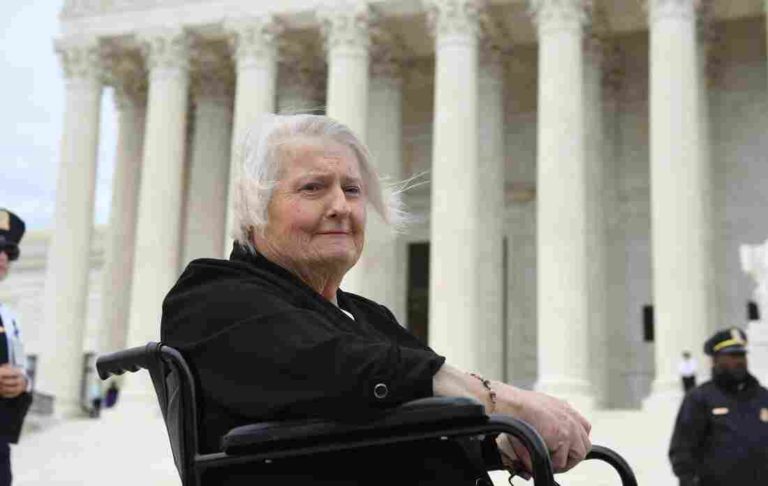

Transgender activist Aimee Stephens sits outside the Supreme Court on Oct. 8 as the court holds oral arguments in cases dealing with workplace discrimination based on sexual orientation. Saul Loeb/AFP via Getty Images hide caption
toggle caption
Saul Loeb/AFP via Getty Images

Transgender activist Aimee Stephens sits outside the Supreme Court on Oct. 8 as the court holds oral arguments in cases dealing with workplace discrimination based on sexual orientation.
Saul Loeb/AFP via Getty Images
Updated at 5:52 p.m.
In a historic decision, the U.S. Supreme Court ruled Monday that the 1964 Civil Rights Act protects gay, lesbian, and transgender employees from discrimination based on sex. The ruling was 6-3, with Justice Neil Gorsuch, President Trump’s first appointee to the court, writing the majority opinion. The opinion was joined by Chief Justice John Roberts and the court’s four liberal justices.
“Today,” Gorsuch said, “we must decide whether an employer can fire someone simply for being homosexual or transgender. The answer is clear.” He found such discrimination is barred by the language in the 1964 law that bans discrimination in employment based on race, religion, national origin or sex.
The decision is a huge victory for the LGBTQ community and a major loss for the Trump administration, which had sided with employers in three cases before the court.
Two involved employees who sued after contending they had been fired because they were gay. One of them, Gerald Bostock, won awards for his work as a child welfare coordinator for Clayton County, Ga, but said he was fired after he joined a gay recreational softball league. As he told NPR in October, “Within months, I was fired for being gay. I lost my livelihood. I lost my medical insurance, and I was recovering from prostate cancer at the time. It was devastating.” The second case involved Donald Zarda, a now-deceased skydiving instructor who was gay.
The third case was brought by Aimee Stephens, who had worked for six years as a male funeral director in Livonia, Mich., but was fired two weeks after she told her boss that she was transgender and would be coming to work as a woman. She died earlier this year, but her case lived on.
Gorsuch couched his opinion in terms of the text of the 1964 statute and its ban on discrimination because of sex.
“It is impossible to discriminate against a person for being homosexual or transgender without discriminating … based on sex,” the justice wrote. He gave the example of two employees attracted to men — one male, the other female. “If the employer fires the male employee for no reason other than the fact that he is attracted to men,” but not the woman who is attracted to men, that is clearly a firing based on sex, he said.
The Gorsuch opinion drew two dissents, one from the court’s other Trump appointee, Brett Kavanaugh, so that Trump’s two appointee were in a verbal version of what Yale Law Professor William Eskridge called “trench warfare.”
Justice Samuel Alito, joined by Justice Clarence Thomas, wrote the lead dissent. It accused the majority of sailing under a “textualist flag,” essentially pretending to remain true to the words of the statute but instead updating it “to better reflect the current values of society.”
John Bursch, who represented the funeral home in the transgender firing case, agreed. “They followed the culture, not the law,” he said.
Gorsuch acknowledged that Congress in 1964 likely did not have the LGBTQ community in mind when it banned discrimination based on sex. But he said the words of the statute are clear. And he pointed to several major court rulings since the law’s passage have read it expansively — for instance, to bar discrimination against women because they have children and to ban sexual harassment against both women and men.
As Gorsuch said of Title VII, “the limits of the drafters’ imagination supply no reason to ignore the law’s demands.”
At the end of his 33-page opinion, however, Gorsuch invoked several potential caveats.
He noted, for instance, that some employers might have valid religious objections to hiring gay or trans workers. But he added that worries about how the 1964 civil rights law “will intersect with religious liberty are nothing new,” pointing to the 1993 Religious Freedom Restoration Act as a “super statute” that may offer a potential lifeline to employers who object, on religious grounds, to hiring gay and trans individuals.
That said, Monday’s ruling was remarkable in many respects. Nearly half the states have no legal protection for LGBTQ employees. Now, the federal law will protect employees in those states from firing and other adverse employment decisions made on the basis of their sexual orientation or gender identity.
The decision is a direct rebuke to the Trump administration, which sided with the employers in these cases, and has used its rule-making power to issue new directives that take away previous protections for transgender individuals.
Although LGBTQ advocates acknowledge that there may well be legal bumps ahead, Stanford Law School professor Pam Karlan voiced her optimism that few LGBTQ workers will face discrimination from large employers such as corporations, hospitals and universities.
“We didn’t see really anybody other than the Conference of Catholic Bishops come in and make an argument that there are large numbers of employers who refuse as a blanket matter to hire people who are lesbian, who are gay or bisexual or who are transgender,” said Karlan, who argued one of the Title VII cases before the Supreme Court in October.
Yale’s professor Eskridge agreed. He noted that the liberal Supreme Court of the 1960s, headed by Chief Justice Earl Warren, interpreted an immigration statute that barred psychopaths from entering the country to apply to homosexuals.
“LGBT people have come a long way in the last generation; the country has come a long way in the last generation; and the Supreme Court has come a long way in the last generation,” said Eskridge, who is the coauthor of a forthcoming book, Marriage Equality: From Outlaws to In-Laws, about the history of same-sex marriage equality in the United States.
Evan Wolfson, founder of Freedom to Marry, added, “One big lesson from this opinion is don’t give up. You have to believe that you can change things.”
Speaking to reporters, Trump said of the ruling: “They’ve ruled and we live with the decision of the Supreme Court.” He called the opinion “very powerful.”
Former Vice President Joe Biden, the presumptive Democratic nominee, praised the Supreme Court’s decision in a statement, saying, “Today, by affirming that sexual orientation and gender identity discrimination are prohibited under Title VII of the Civil Rights Act, the Supreme Court has confirmed the simple but profoundly American idea that every human being should be treated with respect and dignity.”
The opinion is available here.
Emmett Witkovsky-Eldred contributed to this report.

